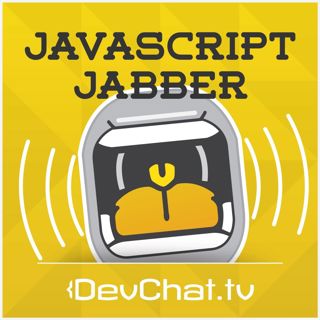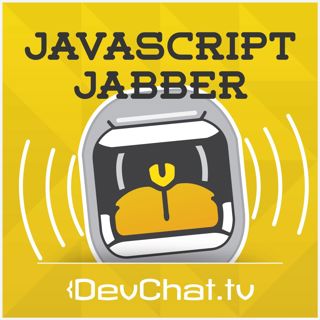
Empowering Devs and Innovators: Inside Vercel’s Impact, Feature Flags, and the Rise of v0 - JsJ 674
In this episode, Lee Robinson, who works at Vercel, discusses the company’s impact on web development despite its relatively small size. He explains their approach to empowering small, founder-led teams to build impactful tools, highlighting their new open-source Flags SDK. They also discuss the importance of server-side feature flagging to improve performance and reduce UI shifts, while warning against exposing sensitive data through client-side experimentation. The conversation then shifts to Vercel’s internal innovation culture, particularly the development of v0, an AI-driven tool for building full-stack web applications quickly, which is especially accessible for non-developers with creative ideas.Become a supporter of this podcast: https://www.spreaker.com/podcast/javascript-jabber--6102064/support.
21 Apr 1h 22min

Building 50 Apps in 50 Days: The Power of Boring Stacks with Kelvin - JsJ_673
In this episode, we dive into an engaging conversation with Kelvin, where we explore his approach to full-stack JavaScript development and the power of using simple, stable technologies to speed up app development.Kelvin shares his exciting project, "Project 50," where he’s challenging himself to build 50 apps in 50 days, highlighting the importance of leveraging "boring" stacks to streamline the development process. We also touch on his journey in teaching web development through free resources and screencasts, aiming to make it easier for developers to build real-world apps quickly. Along the way, we discuss the value of strategy games like chess and Go, and how they help foster critical thinking and continuous learning. It’s a great mix of tech, strategy, and entertainment, making this episode a must-listen for developers and anyone looking to level up their skills. Tune in for a fun and insightful discussion!Become a supporter of this podcast: https://www.spreaker.com/podcast/javascript-jabber--6102064/support.
14 Apr 1h

Breaking Into Tech: Lessons from My Career Path - JsJ 672
This episode is a little different—thanks to a U.S. holiday, I’m flying solo. But that just means we get to have a one-on-one chat!I dive into my career journey—not to brag, but to offer insights for anyone feeling stuck, of how my inventor grandfather sparked my early interest in tech, how I transitioned from electrical engineering to computer engineering, and how I went from IT support to discovering my love for programming while solving real-world problems at Mosey with Ruby on Rails.Become a supporter of this podcast: https://www.spreaker.com/podcast/javascript-jabber--6102064/support.
7 Apr 44min

Pioneers of Computing: A Journey Through Tech History with Bob Martin - JsJ 671
In this episode, we dive into a fascinating mix of tech history, personal stories, and entertainment recommendations. We chat with Bob Martin, who shares insights from his new book, offering a look back at the pioneers of computing, including early breakthroughs and the industry's evolution. Bob talks about the challenges of leaving out influential figures like Margaret Hamilton, Donald Knuth, and Linus Torvalds, while also reminiscing about his early career as a self-taught developer during the 70s.The conversation takes a fun turn when we discuss some mind-blowing tech feats, including a wild project where Doom was implemented using TypeScript’s type system—a true demonstration of the power of programming languages. For those into entertainment, we share some great picks, like the classic science fiction novels When Worlds Collide and After Worlds Collide, plus a rundown of TV shows like Reacher and the intriguing comparison between the Expanse books and TV show. Packed with history, tech talk, and plenty of geeky fun, this episode is a must-listen for anyone interested in the past, present, and future of computing!Become a supporter of this podcast: https://www.spreaker.com/podcast/javascript-jabber--6102064/support.
1 Apr 1h 9min

Beyond Aesthetics: What the Next Generation of Frameworks Should Offer - JsJ_670
In this episode of JavaScript Jabber, our host Charles Max Wood, panelist Dan Shappir, and special guest Yoav Abrahami, CTO of Wix Enterprise, engage in a fascinating discussion on the evolving landscape of web frameworks. They dive into the functional and nonfunctional requirements of frameworks, the emerging innovations in meta frameworks, and the significant market shifts driven by increasing regulations and AI advancements. Yoav shares insights into his work on creating a collaborative web framework aimed at bridging the gap between designers and developers, while also addressing crucial future trends in security and design-to-code capabilities. Tune in to explore the dynamic future of web development with insights from industry leaders.Become a supporter of this podcast: https://www.spreaker.com/podcast/javascript-jabber--6102064/support.
6 Mars 1h 15min

A Guide to AI Models: From Tokenization to Neural Networks with Ishaan Anand - JsJ_669
In this enlightening episode of JavaScript Jabber, hosted by Charles Max Wood and Steve Edwards, panelist AJ O'Neil is joined by guest Ishaan Anand to delve deep into the intricacies of AI and large language models. Ishaan, an expert with over two decades of experience in engineering and product management, shares insights into his innovative implementation of GPT-2, providing a comprehensive breakdown of how transformers work in AI. The discussion covers various aspects of AI, including how models predict the next word, the concept of tokenization, embeddings, and the attention mechanism which is central to transformer architectures. Listen in as they explore practical applications, challenges, and the evolving landscape of AI, with a special emphasis on mentorship and education through Ishaan's unique course offering. Whether you're an AI aficionado or a JavaScript developer eager to expand your knowledge, this episode offers valuable perspectives and learning opportunities.Become a supporter of this podcast: https://www.spreaker.com/podcast/javascript-jabber--6102064/support.
21 Feb 1h 38min

Exploring ReactScan: Aiden Bai's Tool for Identifying React Performance Issues - JsJ 668
In this episode of JavaScript Jabber, panelist Dan Shappir sits down with guest Aden Bai to delve into the nuances of React performance. Broadcasting from Tel Aviv, Dan welcomes Aden, who is based in San Francisco, for an insightful discussion on optimizing React apps. Aden, known for his projects Million JS and ReactScan, shares his journey into coding and his focus on enhancing web performance. Together, they explore the intricacies of the virtual DOM, React rendering processes, and the common pitfalls that developers face in managing performance. Aden introduces ReactScan, a tool designed to visualize and troubleshoot performance issues in React applications, making complex profiling accessible to a broader range of developers. The conversation also touches on broader performance metrics like Core Web Vitals and the challenges of maintaining efficiency across various devices and browsers. Whether you're a seasoned developer or new to React, this episode offers valuable insights into creating faster and more efficient web applications. Tune in to learn how you can improve your React project's performance and user experience with tools and techniques from top industry experts.Become a supporter of this podcast: https://www.spreaker.com/podcast/javascript-jabber--6102064/support.
13 Feb 1h 7min

TanStack: A Deep Dive into Server Functions and Routing with Tanner Linsley - JsJ 667
In this episode of JavaScript Jabber, host Steve Edwards is joined by panelists Dan Shappir and AJ O'Neil, along with special guest Tanner Lindsley, to explore the innovative world of TanStack, a collection of open-source libraries designed to enhance web development. Tanner shares insights into the origins and evolution of TanStack, highlighting its journey from simple libraries like React Table to a comprehensive toolkit including TanStack Query, TanStack Virtual, and more. The discussion delves into the nuances of building framework-agnostic tools, the challenges of server-side rendering, and the rise of remote procedure calls (RPCs) as a modern development approach. With intriguing debates on the future of meta frameworks and the role of server components, this episode provides a deep dive into the cutting-edge technologies shaping the development landscape. Whether you're a fan of React, Solid, or just curious about the direction of web frameworks, this conversation offers valuable insights and expert opinions on the current and future state of web development. Tune in to discover how TanStack is influencing the way we build and manage applications in the ever-evolving JavaScript ecosystem.Become a supporter of this podcast: https://www.spreaker.com/podcast/javascript-jabber--6102064/support.
6 Feb 1h 29min






















